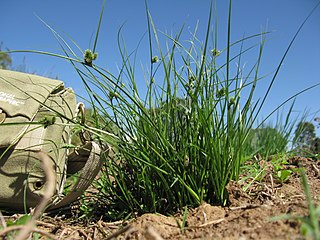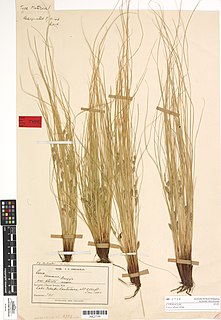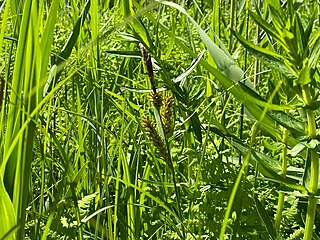
Ficinia spiralis is a coastal sedge endemic to New Zealand. Originally widespread, it has suffered severely from competition with introduced marram grass and animal grazing and now has only a patchy distribution.

Carex pilulifera, the pill sedge, is a European species of sedge found in acid heaths, woods and grassland from Macaronesia to Scandinavia. It grows up to 30 cm (12 in) tall, with 2–4 female spikes and 1 male spike in an inflorescence. These stalks bend as the seeds ripen, and the seeds are collected and dispersed by ants of the species Myrmica ruginodis.

Carex fascicularis, commonly known as tassel sedge, is a species of sedge of the family Cyperaceae that is native to Australia, New Zealand and New Guinea.

Carex inversa, commonly known as knob sedge, is a species of sedge of the family Cyperaceae that is native to parts of Australia and New Zealand and has also been introduced into Great Britain.
Carex tereticaulis, also known as basket sedge, is a species of sedge of the family Cyperaceae that is native to southern parts of Western Australia, southern parts of South Australia, southern and eastern parts of New South Wales as well as north western and central Victoria and Tasmania. The Koori peoples know the plant as Poong'ort.

Carex albula, common name white sedge, is a species of sedge. It is endemic to the South Island of New Zealand.

Carex rugulosa, also known as the thick-nerve sedge or the slender-culm thick-nerve sedge, is a tussock-forming perennial in the family Cyperaceae. It is native to eastern parts of Asia.

Carex breviscapa is a tussock-forming perennial in the family Cyperaceae. It is native to eastern parts of the south east Asia and north eastern Australia

Carex scaposa, also known as hua ting tai cao in Chinese, is a tussock-forming species of perennial sedge in the family Cyperaceae. It is native to eastern parts of Asia.

Carex ventosa, also known as Chatham Islands forest sedge, is a tussock-forming species of perennial sedge in the family Cyperaceae. It is native to the Chatham Islands.

Carex parva, also known to Chinese people as xiao tai cao, is a tussock-forming species of perennial sedge in the family Cyperaceae. It is native to parts of Asia from Afghanistan to Mongolia.

Carex lessoniana, also commonly known as rautahi or cutty grass, is a tussock-forming species of perennial sedge in the family Cyperaceae. It is native to parts of New Zealand.

Carex gaudichaudiana, also known as fen sedge, is a tussock-forming species of perennial sedge in the family Cyperaceae. It is native to parts of Australia and New Zealand.
Carex arkansana is a tussock-forming species of perennial sedge in the family Cyperaceae. It is native to central parts of the United States.
Carex californica is a tussock-forming species of perennial sedge in the family Cyperaceae. It is native to western parts of the United States.

Carex congdonii is a tussock-forming species of perennial sedge in the family Cyperaceae. It is native to parts of California.

Carex donnell-smithii is a tussock-forming species of perennial sedge in the family Cyperaceae. It is native to parts of Mexico and Central America.

Carex gravida, also known as heavy-fruited sedge, heavy sedge or long-awned bracted sedge, is a tussock-forming species of perennial sedge in the family Cyperaceae. It is native to southern parts of Canada and parts of the United States.

Carex hendersonii, also known as Henderson's sedge or carex de Henderson, is a tussock-forming species of perennial sedge in the family Cyperaceae. It is native to western parts of North America.
Carex catharinensis is a tussock-forming species of perennial sedge in the family Cyperaceae. It is native to parts of eastern parts of South America.
















